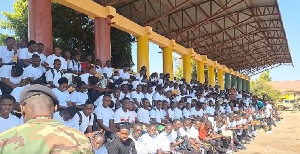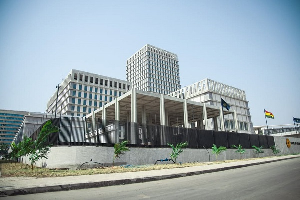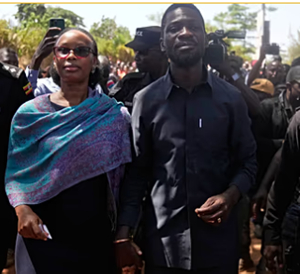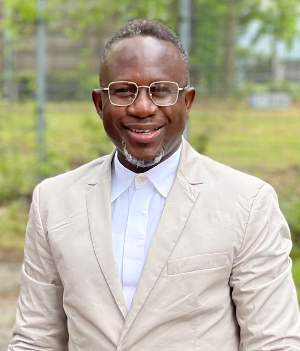The arrest and detention of over 600 demonstrating Liberian refugees at their Buduburam camp in the Central region of Ghana gives ample proof to the fact that no country hosting refugees would stay aloof for its laws to be violated by “marauding” citizens of another country.
It is unfortunate that Liberians fought themselves in a country once considered a haven for other West African citizens determined to improve their living conditions while exploring the gateway to settle in the United States.
When Ghana opened its doors to Liberian refugees 18 years ago, it was in fulfillment of her much touted hospitality, and extending a benevolent hand to fellow Africans faced with a difficult situation in their homeland, and on the high seas with no country willing to accept them. No African country, as it were, was prepared to accept Liberian refugees during that country’s civil war.
Not a surprise, Ghana is always proud to remind itself of the dictates of a Pan-African foreign policy, a country willing to open its doors to all Africans. Ghana’s acceptance of Liberian refugees into the country was no exception.
Let me just revisit some of the fallouts of demonstrations.
Many years ago, I was in New-Jersey ,when six Ghanaians were engaged in a free-for-all- fight with some Haitians at work as a result of the latter accusing the former for always working, and not being part of demonstrations in New-York aimed at highlighting the plight of a Haitian immigrant who was manhandled by officers of New York Police Department (NYPD).
In their argument, the Ghanaians explained that even though demonstrations help, the law should be allowed to take its course, adding that it was the surest way through which perpetrators of a barbaric act are found guilty and punished. This did not satisfy the Haitians, insults followed, and a squabble developed.
Subsequently, in a similar demonstration organized in the State of Florida, some illegal/undocumented Haitians and refugees were arrested, and later deported to their home country. As usual, there was public outcry of unfair treatment.
What a foolish tale of an illegal immigrant engaging in an illegal demonstration, though genuine refugees are protected by international law.
If, indeed, there is “fairness” in any part of the world, I would say the United States stand tall amongst comity of nations- a nation that makes you “free”, reminding every individual to avail him/herself to the many opportunities therein. But no individual is above the law.
Personally, when George Stephanopoulos, former Clinton aide, was arrested for a traffic-related offence, it offered me a sense of moral uprightness, that law enforcement is functional.
Though these scenarios are different, it is a statement of fact than an opinion, to suggest that no country has room for recalcitrant refugees/ or immigrants who disregard laws and advise from a country hosting them, not even the United States, a country which is the highest financial contributor to the United Nations, and yet unmatched as regards its acceptance and equal treatment of immigrants and refugees.
In the United States, genuine refugees are documented and given authorization to work, they are not fed three times a day, and neither are they given bags of rice, some of which are re-sold to its citizens.
Demonstrations facilitate a process through which people’s frustrations and anger can be expressed, some of them are legitimate concerns, but it is equally important to note that channels for sensible dialogue and mediation are better alternatives.
Some demonstrations are unnecessary, to say the least, and they do not solve problems.
This is why the arrest of Liberian refugees in Ghana with the intention to repatriate them is a welcome relief in a country preparing to organize both presidential and parliamentary elections in December 2008.
The work of Ghana Police cannot be overstretched in an election year, guided by the fact that, intrinsically, Ghanaians are non-violent and law-abiding.
Historically, it is also true, that every demonstration has an antecedent, and in the case of Liberian refugees in Ghana one has been identified.
At their first meeting held at the Buduburam camp many years ago, the refugees complained to Kofi Portuphy, then coordinator of National Mobilization Program, that they are served bread without margarine or peanut butter during breakfast.
In his response, a "furious-looking" Portuphy reminded the refugees that many Ghanaians do not even have their bread buttered for breakfast. That answer curtailed many unnecessary questions lined up by the refugees.
There is a common saying that "if an Italian offers you a pizza made without cheese, it may be due to the fact that prices of dairy products have sky-rocketed". Liberian refugees in Ghana should learn from this.
I have breathe a new sigh of relief, the reason being that the present government is also not succumbing to lawlessness on the part of refugees who now appear to be showing signs of ungratefulness to the people of Ghana.
It is just unfortunate that these detained refugees are mainly women. This requires a compassionate solution, and their welfare should be of major concern to UNHCR and the government of Ghana.
But their unlawful conduct is unacceptable, and contravenes the humility, tactfulness, and respect associated with a visiting brother or a sister, a direct imitation of the United States version of “immigrants’ nonsense”, a phenomenon that must not be allowed to flourish in a peaceful Ghana where the citizenry are also living within the limitations of the global economy, and are not spared when they violate the law.
The unethical premise being that, it is a shame to bite a hand that fed you once upon a time when no individual or country accepted you, let alone offering you porridge with “unbuttered” bread.
The justification for their repatriation is that, there is a limit to every individual/ or country's generosity.















